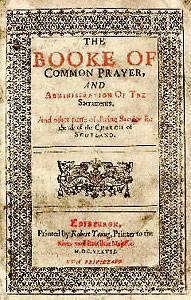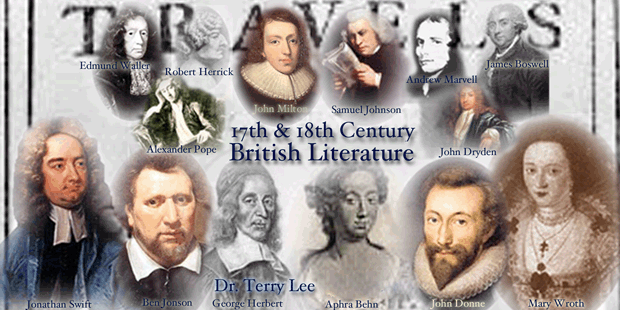
- English 372
- Seventeenth- & Eighteenth-Century British Literature
class website, where you'll find the syllabus: http://www.risingpress.org/cnu
-
- Spring 2011 | Dr. Terry Lee
- McMurran 262• TTh 2:30-3:45
- Office: McMurran 201B• Office Hours—TTh 1-2; W 3-4, & by appt.
- 594-7686 / tlee@cnu.edu
Course goals:
To develop a basic understanding of the ideology of the periods
To develop a basic appreciation for the poetry, prose and drama
To engage the works as analytical and intepretative readers
Texts:- • Norton Anthology of English Literature, Vol. 1, 8th ed.
• Evelina, Frances Burney (Bedford edition, edited by Kristina Straub)
- • A literary terms reference (buy on your own) such as:
The Penguin Dictionary of Literary Terms and Literary Theory (recommended), M.H. Abrams's A Glossary of Literary Terms , or any number of other references.
MLA online resources: in text citation; Works Cited
Coffee house resource: Colonial Williamsburg's R. Charlton's Coffeehouse

For the price of a Colonial Williamsburg
ticket, you can visit the Richard
Charlton coffeehouse, a true
18th-century shop.
- • Class Policies
- Scroll to the bottom of this syllabus, or consult your hard copy of the syllabus.
- Requirements:
- • 1 analytical / intepretative essay (8 pp./ 2,000 words) (25%)
- —Papers are due on assigned topics in weeks 2-13. You will write about works as they come up on the assignment list. The paper is due two weeks after the work you write about comes up in class. While you are welcome to use research to help you develop your paper, this is not a research paper. What's important is your own thinking and analysis, working closely with the literature and—importantly—the rubric in the topic that you select. Straying from the rubric can result in a failing grade. What's important is your own engagement with the literature, with its language, with its historical context.
- —Paper topics:
- Sign up for one of the assigned topics: click here for topics
- —Paper-writing workshops: 2/8, 2/22, 3/22
—Grading Criteria: - Late work, if accepted, is graded down.
- For requirements for these essays and a rubric describing grading criterion, prohibited "research" resources, legitimate research resources, and plagiarism, click here:
- • Five quizzes (50%)—open-notebook: quotation identification, short answer and/or short essay.
• Final Exam: ( 25%)—2-4 open-notebook essays
• Demonstrated understanding and use of literary and historical terminology in quizzes, in the interpretative / analytical essay and final exam.
__________________________________________________________________________
Assignment List
- Week 1
- 1/11
- • Introduction
1/13
- CONTEXTS
- 16th Century:
• "The Institution of Christian Religion," Calvin [625]
• "Elizabeth"—Focus Features , "Mary, Mary"
- HUMAN NATURE & RELIGION
- • "Intro. to Early 17th C, State & Church" [1235-1242]
- • "Religion & England" [A90]
Further interest:
• Newspaper origins: The Oxford / London Gazette
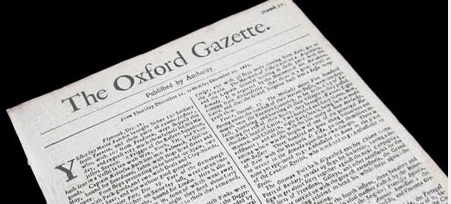
The Oxford Gazette, later the London Gazette (still in print)
as possibly the first newspaper in England.
• Puritan Discontent with theaters—a brief history
• Seventeenth-Century British History: Civil War & Revolution. BBC Online
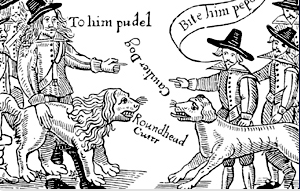
A contemporary representation of tension surrounding
the Gunpowder Plot, 1605.
-
-
Week 2
-
1/18 • RELIGIOUS CONSCIOUSNESS
-
• "On the Morning of Christ's Nativity," Milton [1789]
-
• "Meditation 17," Donne [1305]
• "Easter Wings," Herbert [1609]• "Church Monuments," Herbert [1612] -
1/20 -
• "Affliction (1)," Herbert [1609]
-
• "#14: Batter My Heart," Donne [1297]
-
• "Denial," Herbert [1613]
-
• "#13: What if this," Donne [1297]
-
• "Bunch of Grapes," Herbert [1617]
-
• "On the Wounds," Crashaw [1644]
-
• "The Flaming Heart," Crashaw [1650]
-

"St. Teresa's Esctasy"
St. Teresa of Avila (1515-1582) in the Cornaro Chapel,
Santa Maria della Vittoria, Rome. Completed by the
sculptor Gian Lorenzo Bernini in 1652. -
-
Week 3
-
1/25
-
• Pilgrim's Progress, Bunyan [2143]
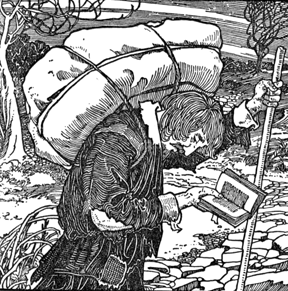
Christian, on his journey.
Further reading (optional); -
-
1/27 • MATRIMONY & LOVE
-
• "When Night's Black Mantle," Mary Wroth [1457]
-
• "Am I Thus Conquered?" Wroth [1457]
-
• "The Flower," Herbert [1621]
-
• "A Celebration of Charis," [download .pdf for full version]• "Song: To Celia," Jonson [1436]
-
-
• "On Giles & Joan," Jonson [1429]
-
-
Week 4
-
2/1
-
• "A Song to Amoret," Vaughn [1626]
-
• "A Married State," Katherine Philips [1691]
-
• "Some Reflections on Marriage," Mary Astell [2285]
-
• "Methought I Saw My Late Espoused Saint," Milton [1829]
-
Further reading (optional)
• "The Slain Deer & Political Imperium," Chris Fitter (essay on "The Nymph Complains")
• "The Imperfect Enjoyment," John Wilmot [2169] -
• "The Disappointment," Aphra Behn [2180]
-
2/3 • TIME & COME-ONS -
• "Time," Herbert [1616]
-
• "Corinna's Going A-Maying," Herrick [1658]
-
• "Love Made in the First Age," Lovelace [1684]
-
• "The Vine," Herrick [1655]
-
• "Song," Waller [1687]
-
• "Song," Mary Wroth [1456]
-
• "#40: False Hope," Mary Wroth [1459]
-
• "To the Virgins," Herrick [1659]
-
Week 5
-
2/8
• Quiz 1: quotation identification, short answer and/or brief essay
• Paper-writing workshop
2/10 • PARADOX & DIVIDED NATURE -
• "The Definition of Love," Marvell [1704]
-
• "A Dialogue," Marvell [1699]
-
-
• "Virtue," Herbert [1614]
-
• "The Collar," Herbert [1619]
-
• TRANSCENDENCE
-
• "To Althea From Prison," Lovelace [1683]
-
• "The Garden," Marvell [1710]
• METAPHYSICAL CONCEIT & the PRIVATE WORLD
• "The Flea," John Donne [1263]
• "A Valediction," Donne [1275]
• "The Sun Rising," Donne [1266]
• "To His Coy Mistress," Marvell [1703]
-
Week 6
-
2/15 • THE SOCIAL WORLD &
-
the CAVALIER
-
• Introduction to 17th.-century Literature & Culture [1242-50]
-
• "The Ode on Cary & Morison," Jonson 1409 [1439]
-
• "The Bad Season," Herrick [1663]
-
• "The Grasshopper," Lovelace [1682]
-
• "To Mrs. M.A.," Katherine Philips [1693]
-
• "Inviting A Friend to Supper," Jonson [1432]
-
• "To William Camden," Jonson [1428]
-
• "To John Donne," Jonson [1429]
-
• "The Hock Cart," Herrick [1660]
-
• "Delight in Disorder," Herrick [1656]
-
2/17• THE NATURE OF 'MAN' -
• Introduction to Eighteenth Century [2057-2080]
-
• "An Essay Concerning," Locke [2152]
-
• "An Essay on Man," Pope [2540]
-
• "Meditation 4," Donne [1303]
- Week 7
- 2/22
-
• "Arbuthnot," Pope 2562 [2548]
• "L'Allegro," Milton [1797] -
• "Il Penseroso," Milton [1801]
• Paper-writing workshop -
from "L'Allegro:"
-
But come thou goddess fair and free,
-
In heaven yclept Euphrosyne (ll. 11-12)
-
Botticelli's "Primavera" (below)
-
pictures the early Renaissance
-
view of the three Graces—
-
Euphrosyne (youthful mirth),
-
Aglaia (Brilliance) and
-
Thalia (Bloom)
2/24BIOGRAPHY
A close-up of Pepys's diary... in his coded shorthand.
• "The Diary," Pepys [2134]
• "Rambler 60," Johnson [2746]• "On Shakespeare & Jonson," Dryden 2117 [2128]• "Epigram on Milton," Dryden [2120]
• "A Life," Boswell [2781]
Week 8
3/1
• Spring Break3/3
• Spring Break
Week 9
3/8Quiz 2: quotation identification, short answer and/or brief essay
RESTORATION DRAMA
• Puritan Discontent
• Brief online history of Restoration drama
• Introduction (vii-xvi ) & Act 1—The Rivals
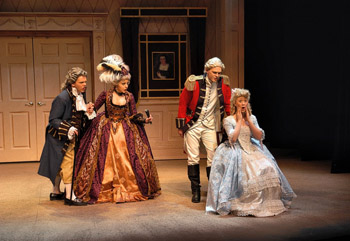
3/10
• Act 2 The Rivals (Meet at Ferguson rehearsal hall, T107)
- Week 10
3/15
• Acts 3 & 4 The Rivals (Meet at Ferguson rehearsal hall, T107)
3/17
• Act 5 The Rivals
Week 11
3/22
• Quiz / essay 3: The Rivals: quotation identification, short answer and/or brief essay
• Paper-writing workshop
3/24
• Evelina, Introduction (3-31)
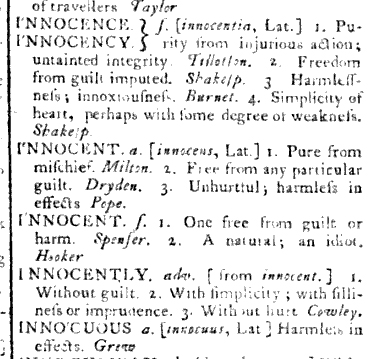
from Johnson's Dictionary
-
Week 12 -
3/29
• Evelina, Volume 1 (57-177)
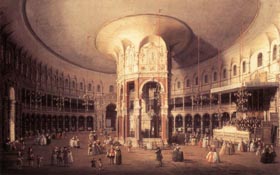
Ranelegh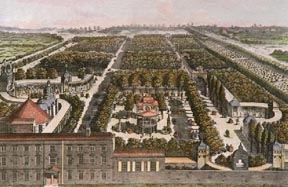
Vaux Hall
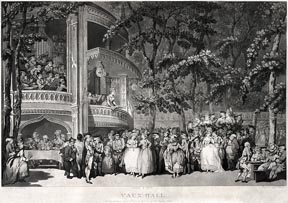
Vaux Hall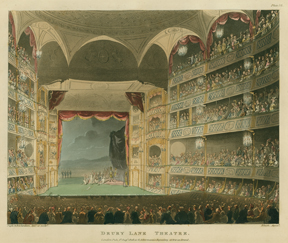
Drury Lane Theater
-
3/31
• Evelina, Volume 2 (177-308) -
-
Week 13
-
4/5
• Evelina, Volume 3 (308-436) -
4/7
• Quiz / essay 4: Evelina : quotation identification, short answer and/or brief essay
• SATIRE
• Gulliver's Travels Part 2 [2365-2404]
• "The Art of Satire," Dryden [2131] -
-
Week 14
-
4/12
• Gulliver's Travels Part 3 [2405-2417]
• "Gulliver Travels" from Jim Henson Productions
4/14 -
•Gulliver's Travels Part 4 [2418]
-
Week 15
4/19
• Quiz / essay 5: Take-home— Biography, Gulliver brief essay
• Meet in the Ferguson rehearsal hall for performances of scenes in The Rivals and School for Scandal
4/21
-
• Paradise Lost, Milton 1815 [1830]
The numbers below are lines (not pages):
—Book 1: 1-80, 192-238
—Book 2: 99-505
—Book 4: 1-113, 358-410 -
—Book 6: 680-912
-
—Book 9: 532-833
-
—Book 10: 909-1006
-
General Course Policies
Cell phones
Cell phones must be turned off and out of sight at all times in class. If you text during class, you will be asked to leave the class.
Laptop computers
Laptops and tablets (i.e., the iPad) may not be used in class without the instructor's permission.
Leaving the Classroom during Class
Do not get up and leave the classroom during class.
OFFICE HOURS
My door is always open, and I am happy to see you during my office hours, as well as other times that I'm in my office—drop by or call or e-mail to see if I'm in. You are welcome anytime to come by and talk about your class work in general, or about a specific reading or essay draft on which you are working.Plagiarism
Any instance of plagiarism results in failure of the course. See more about plagiarism and how to avoid it.
Learning Disabilities
If you believe that you have a disability, you should make an appointment to see me to discuss your needs. In order to receive an accommodation, your disability must be on record in the Dean of Students office, 3rd Floor David Student Union/DSU (Telephone 594-7160).
E-MAIL
Feel free to check in with questions about any aspect of the class. tlee@cnu.eduPhone
My office phone: 594-7686Attendance
Not Attending Class Can Result in Failure of Course
You may miss one week of class without any penalty or consequence. You are responsible for the material covered, of course, and I draw my exam questions from material covered in class, class discussion and lecture, as well as from our texts.Additional absences will result in reduction of your final course grade.
That means that a "B" in all of your coursework can become a "C," if you have excessive absences. It also means that a passing grade for the course can become a failing grade for the course.
In the case of an emergency, contact me as soon as possible. Emergency absences can be excused, and I may ask for documentation.
In general, let me know what's up if you're not in class.Tardiness
Tardiness counts as absence, as does leaving class early. If you have specific reason for arriving late or leaving early, please check with me. If this will be a recurring problem, please see me at the beginning of the semester.
Late Work
I will not accept late work in this class, except in extraordinary cases.Complete All Work
You must complete all work by the last day of class to receive a passing grade. That means that missing in-class assignments can result in failure of the course.Incompletes
Given only in extraordinary circumstances. Plan to complete work by last day of class. Not completing the work results in an "F," not an "I."
